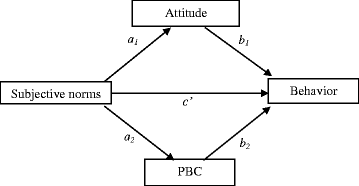A survey on HIV-related health-seeking behaviors among transgender individuals in Jakarta, based on the theory of planned behavior
- PMID: 26573618
- PMCID: PMC4647823
- DOI: 10.1186/s12889-015-2480-0
A survey on HIV-related health-seeking behaviors among transgender individuals in Jakarta, based on the theory of planned behavior
Abstract
Background: Male-to-female transgender (waria) individuals are at high risk for HIV. This study aims at mapping the psychological determinants of four HIV-related health-seeking behaviors. This knowledge can be used to develop effective interventions to prevent the spread of HIV/AIDS.
Methods: The study involved 209 waria from five districts in Jakarta, selected with a cluster sampling procedure. Cross-sectional data were gathered through structured interviews. The four examined behaviors are, visiting sexually transmitted infections (STIs) services regularly, adherence to STI treatment, taking an HIV test and picking up the result of HIV test. For all four behaviors, specific measures of the psychological determinants as defined by the Theory of Planned Behavior were developed: attitudes, subjective norms and perceived behavioral control (PBC). Logistic regression analyses were conducted with these three psychological measures as independent variables and the behaviors as dependent variables.
Results: Of the 209 waria, 20.6 % had never visited STI services in the last 6 months, while 56.5 % had visited the services once or twice, and 23 % had visited the service three or more times. A HIV test had been taken by 90.4 % of the waria, and of those, 64.6 % had picked up the results. About 85 % of the waria who did a HIV test had been tested for HIV one or two times in the last 6 months and 10 % had been tested three to four times. The variance in behaviors that was explained by the concepts defined in the Theory of Planned Behavior ranged from 15 to 70 %; PBC was the most powerful predictor. Furthermore, the results showed that in several cases the relationships of attitudes or subjective norms with the dependent variable were mediated by one or both other independent variables.
Conclusions: The results regarding the prominent role of PBC suggest that interventions should increase waria's control over the behavior: Engaging in specific desired behaviors should be made easier for them. Besides, waria's attitudes and subjective norms should be addressed, by education, but possibly also by providing waria with a positive experience with the behavior, for example, by designing a professional and friendly health care system.
Figures
Similar articles
-
Preparatory behaviours and condom use during receptive and insertive anal sex among male-to-female transgenders (waria) in Jakarta, Indonesia.J Int AIDS Soc. 2014 Dec 19;17(1):19343. doi: 10.7448/IAS.17.1.19343. eCollection 2014. J Int AIDS Soc. 2014. PMID: 25529498 Free PMC article.
-
Driving factors of retention in care among HIV-positive MSM and transwomen in Indonesia: A cross-sectional study.PLoS One. 2018 Jan 17;13(1):e0191255. doi: 10.1371/journal.pone.0191255. eCollection 2018. PLoS One. 2018. PMID: 29342172 Free PMC article.
-
Barriers and Enablers to HIV Care Among Waria (Transgender Women) in Indonesia: A Qualitative Study.AIDS Educ Prev. 2019 Dec;31(6):538-552. doi: 10.1521/aeap.2019.31.6.538. AIDS Educ Prev. 2019. PMID: 31815531
-
A global research synthesis of HIV and STI biobehavioural risks in female-to-male transgender adults.Glob Public Health. 2016 Aug-Sep;11(7-8):866-87. doi: 10.1080/17441692.2015.1134613. Epub 2016 Jan 20. Glob Public Health. 2016. PMID: 26785800 Free PMC article. Review.
-
Influence of trust on HIV diagnosis and care practices: a literature review.J Int Assoc Physicians AIDS Care (Chic). 2010 Nov-Dec;9(6):346-52. doi: 10.1177/1545109710380461. Epub 2010 Nov 12. J Int Assoc Physicians AIDS Care (Chic). 2010. PMID: 21075915 Review.
Cited by
-
Health-Seeking Behavior of People in Indonesia: A Narrative Review.J Epidemiol Glob Health. 2020 Mar;10(1):6-15. doi: 10.2991/jegh.k.200102.001. J Epidemiol Glob Health. 2020. PMID: 32175705 Free PMC article. Review.
-
The future of PrEP among transgender women: the critical role of gender affirmation in research and clinical practices.J Int AIDS Soc. 2016 Oct 18;19(7(Suppl 6)):21105. doi: 10.7448/IAS.19.7.21105. eCollection 2016. J Int AIDS Soc. 2016. PMID: 27760683 Free PMC article. Review.
-
Transgender women, hormonal therapy and HIV treatment: a comprehensive review of the literature and recommendations for best practices.J Int AIDS Soc. 2016 Jul 17;19(3 Suppl 2):20810. doi: 10.7448/IAS.19.3.20810. eCollection 2016. J Int AIDS Soc. 2016. PMID: 27431475 Free PMC article. Review.
-
Antiretroviral Treatment Interruptions Among Black and Latina Transgender Women Living with HIV: Characterizing Co-occurring, Multilevel Factors Using the Gender Affirmation Framework.AIDS Behav. 2019 Sep;23(9):2588-2599. doi: 10.1007/s10461-019-02581-x. AIDS Behav. 2019. PMID: 31263998 Free PMC article.
References
-
- Pisani E, Girault P, Gultom M, Sukartini N, Kumalawati J, Jazan S, Donegan E. HIV, syphilis infection, and sexual practices among transgenders, male sex workers, and other men who have sex with men in Jakarta, Indonesia. Sex Transm Infect. 2004;80(6):536–40. doi: 10.1136/sti.2003.007500. - DOI - PMC - PubMed
-
- Ministry of Health Republic of Indonesia/MOH RI, Ministry of Justice and Human Rights Republic of Indonesia, National AIDS Commission, GFATM, SUM1/USAID, Worldbank. Survei Terpadu Biologis dan Perilaku pada Kelompok Berisiko Tinggi di Indonesia 2011. Lembar Fakta: Waria (Integrated Biological and Behavioral Survey among Most at Risk Population in Indonesia 2011. Fact sheet: Waria).
-
- Badan Pusat Statistik & Departemen Kesehatan . Behavioral Surveillance Survey (BSS) Result in Indonesia 2004–2005. 2005.
MeSH terms
LinkOut - more resources
Full Text Sources
Other Literature Sources
Medical



